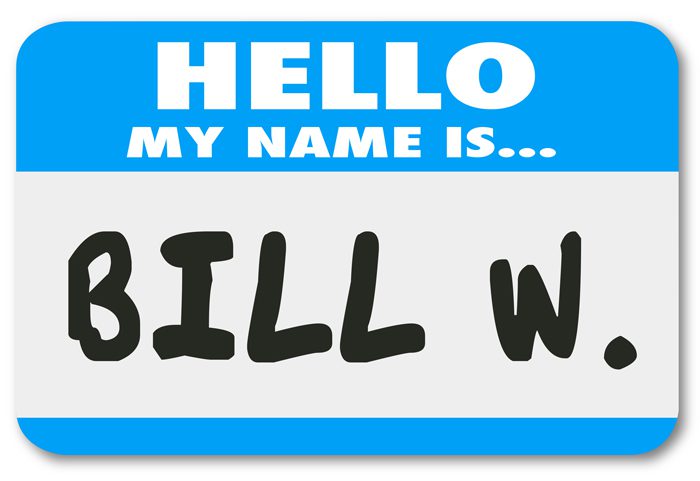 Alcoholics Anonymous was founded in 1935 by Bill Wilson and Dr. Bob Smith.
Alcoholics Anonymous was founded in 1935 by Bill Wilson and Dr. Bob Smith.
They developed a twelve-step program of spiritual and character development. AA is a fellowship of men and women who share their experience, strength, and hope with each other that they may solve their common problem and help others to recover from addiction. The only requirement for membership is a desire to stop drinking. The primary purpose is to help people in addiction recovery to stay sober. The initial Twelve Traditions were introduced in 1946 to help the fellowship be stable and unified and to not engage in “outside influences and issues.”
Since AA was established, many other twelve-step programs have been initiated on the same basic principles to help people recover from various addictions, behaviors, and disorders. The twelve steps are as follows:
- We admitted we were powerless over alcohol—that our lives had become unmanageable.
- Came to believe that a power greater than ourselves could restore us to sanity.
- Made a decision to turn our will and our lives over to the care of God as we understood Him.
- Made a searching and fearless inventory of ourselves.
- Admitted to God, to ourselves, and to another human being the exact nature of our wrongs.
- Were entirely ready to have God remove all of these defects of character.
- Humbly asked Him to remove our shortcomings.
- Made a list of all persons we had harmed, and became willing to make amends to them all.
- Made direct amends to such people wherever possible, except when to do so would injure them or others.
- Continued to take personal inventory and when we were wrong promptly admitted it.
- Sought through prayer and meditation to improve our conscious contact with God as we understood Him, praying only for the knowledge of His will for us and the power to carry that out.
- Having had a spiritual awakening as the result of these twelve steps, we tried to carry this message to alcoholics and to practice these principles in all our affairs.
People who desire to stop drinking can walk into any AA meeting.
The meetings are free and are worldwide. There are plenty of meetings to choose from: Step meetings, which focus on one step a week; Big Book meetings, in which a section of Alcoholics Anonymous is read and discussed; Living Sober meetings, in which a chapter of Living Sober is read and discussed; God as I Understand Him meetings, which are held on Sunday mornings and feature a speaker who discusses their personal understanding of a higher power, followed by discussion. These meetings are not religious and may be a good alternative to going to church for some people. Speaker meetings are meetings where someone has been asked to speak about their journey and share their experience, strength, and hope. These are just a few of the many formats meetings can take. It is important to find a sponsor to help you through the steps, and meetings that work for you. Other groups that are based on the twelve steps are:
- Narcotics Anonymous – NA is a twelve-step group based on the same principles as AA. People with substance addictions can attend AA or NA.
- Overeaters Anonymous/ Food Addicts Anonymous
- Adult Children of Alcoholics
- Cocaine Anonymous-
- Crystal Meth Anonymous
- Co-Dependents Anonymous
- Gamblers Anonymous
- Heroin Anonymous
- Marijuana Anonymous
- Nar-Anon – These meetings are for family members and friend of the person addicted to drugs to come together and share their struggles and hopes. Group members help one another to cope heal from hurt caused by another’s addiction.
- Al-Anon, Alateen – This is also a worldwide fellowship that offers a program of recovery for the families and friends of people addicted to alcohol or other drugs.
- Pills Anonymous
- Sexaholics Anonymous/ Sex and Love Addicts Anonymous
- Smokers Anonymous/Nicotine Anonymous
- Survivors of Incest Anonymous
- Workaholics Anonymous
Attending meetings has helped people worldwide.
There are many more twelve-step groups available that help with just about any addiction or disorder. All meetings are international, online, and free. These groups are called ‘anonymous’ for a reason. What is said in the rooms stays in the rooms. It is a place where you can share your feelings with people who are struggling with the same issues. Individuals with addictions and disorders often isolate because they feel no one knows what they are going through. Meeting people with the same issues helps tremendously. You never have to be alone again.
If you are looking for a program of recovery that does not follow the twelve steps, SMART may be for you. SMART, Self Management and Recovery Training, is not based on the twelve steps. It is a 4-point program that helps people recover from all types of addictions including: substance abuse, alcohol abuse, gambling addiction, sex addiction, and more. SMART recovery supports getting a sponsor, and meetings can also be found online.
The 4- point program is as follows:
- Building and maintaining motivation
- Coping with urges
- Managing thoughts feelings and behaviors
- Living a balanced life
Their approach:
- Teaches self-empowerment and self-reliance
- Offers meetings that are educational, supportive, and include open discussion
- Teaches techniques for change
- Works on substance abuse as complex maladaptive behaviors with possible physiological factors.
If you or someone you love is struggling with an addiction or disorder, help is available. Whether you choose step meetings or SMART recovery, it is good to get into a group that will help you through.
Reference:




